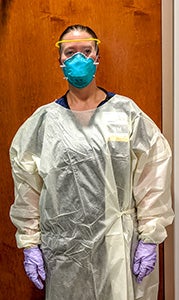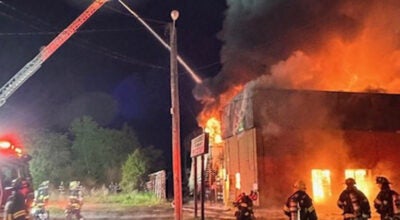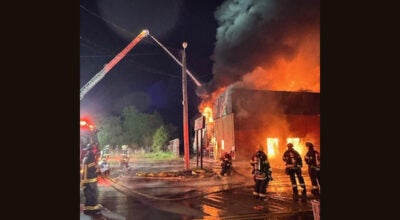Suffolk prepares for coronavirus
Published 9:23 pm Thursday, March 5, 2020

- Autumn Weaver, team coordinator for employee health at Sentara Obici Hospital, shows the standard droplet protection that staff would wear if they come into contact with anyone suspected of having a communicable disease, including coronavirus. The items include protective eye wear, N95 respirator mask, gloves and an isolation gown. Employees are fitted yearly for the masks and are educated on how to put it on and take it off.
|
Getting your Trinity Audio player ready...
|
Local health and city officials want people to be vigilant about washing hands and practicing good hygiene, but they also don’t want people to be overly alarmed about the coronavirus epidemic.
In the United States, there have been 100 confirmed cases of COVID-19, the respiratory illness that can spread from person to person and is caused by a new coronavirus known as SARS-CoV-2, and 10 deaths associated with it through Wednesday, according to the Centers for Disease Control and Prevention and the Virginia Department of Health.
State epidemiologist Dr. Lillian Peake said Thursday that 21 people in Virginia have been tested for coronavirus, with 18 of those tests coming back negative and another three whose results are pending. Thirteen states, including North Carolina, have reported coronavirus cases.
Potential cases of COVID-19 are now tested at the state’s Division of Consolidated Laboratory Services, rather than through the CDC, which allows for a quicker determination. However, Peake said it has only “a very small number of test kits from the CDC.”
She added that there is no specific treatment for coronavirus, though the federal government is doing research to develop an antiviral treatment.
Sentara Obici Hospital has been making preparations for treating the coronavirus since the first COVID-19 case was confirmed in the United States on Jan. 21 in a traveler who had recently returned from Wuhan, Hubei Province, China, where the outbreak began and has since killed at least 2,462 people worldwide. That task force also encompasses Sentara Belle Harbour in North Suffolk and Sentara St. Luke’s in Isle of Wight County.
Sentara’s task force has been addressing such things as needed materials, taking care of its employees, needs of the hospital and emergency departments at Obici and Belle Harbour and treating the coronavirus itself.
The hospital has implemented protocols for staff, as well as for people who come to the hospital who suspect they may have it. Sentara Obici has also been in consultation with VDH, the CDC, the state Department of Emergency Management, the Virginia Hospital and Healthcare Association and other hospitals across the country. The state put together an incident management team in January to deal with the state’s planning and response to the coronavirus.
“There’s no need to panic,” said Dr. Chris Maples, medical director of Sentara Obici’s emergency department. “Obviously, the coronavirus will likely become more widespread than it already is. There are probably more cases out there that we do not know about, not necessarily locally, but in general.”
Karen Zastrow, an infection preventionist at Sentara Obici, said preventive steps should include people washing their hands, sneezing or coughing in their arm and staying away from large groups of people if sick.
The CDC said most people in the U.S. “will have little immediate risk of exposure” to the coronavirus, as it is not widespread in the country at this point. The CDC notes, however, that “current global circumstances suggest it is likely that this virus will cause a pandemic.”
Those with elevated risk include health care workers caring for patients with COVID-19, or those who are in close contact with people who have COVID-19.
The CDC expects more cases to be identified soon in the U.S., and that widespread transmission of COVID-19 is likely.
City Manager Patrick Roberts said Wednesday that Suffolk’s preparations for coronavirus are in line with other localities, and it is following CDC guidance, including updating the city’s pandemic plan developed during the H1N1 outbreak in 2009.
Roberts said the plan would include updating the city’s leave and attendance policies to give people guidance to stay away from work if they are sick, and a business continuation plan to provide backup staff for core government functions if large numbers of employees are out sick.
The city is also updating and obtaining provisions and supplies to give to first responders as well as “front-facing people in health and social services,” Roberts said, to protect everyone who may come in contact with the virus.
Though Thursday, the outbreak had spread throughout China and to 36 other countries and territories, including the U.S. Twenty-two countries on three continents — affecting more than 290 million students worldwide — have closed schools, according to the United Nations.
Suffolk Public Schools has also been reviewing and updating its response plans. “We are maintaining close contact with the Suffolk Health Department and are receiving updates as they come available,” said Community Engagement Officer Anthonette Ward in a statement. “Our cleaning and disinfecting efforts within the buildings increased early in the cold and flu season and will continue.”
The House of Representatives and the Senate, meanwhile, have overwhelmingly approved an emergency $7.8 billion funding bill Thursday to deal with coronavirus and awaits President Donald Trump’s signature.
Virginia would immediately receive $13.3 million in federal funding to help cover preparation costs, according to Sens. Tim Kaine and Mark Warner. The bill also provides for $350 million for local authorities if Virginia experiences a coronavirus outbreak, and another $500 million for masks, medication, protective equipment and other medical supplies to be distributed to hospitals and local health care providers.
Additional money in the bill will go toward diagnostic testing, vaccine development and added resources for state and local first responders.
So when should people seek medical attention? The ones Maples said concern them most, are any sort of fever or respiratory illness combined with recent travel to areas known to have the coronavirus and recent contact with people at risk for the illness.
Someone with those symptoms, Maples said, should wear a mask, practice proper coughing hygiene, continue to wash their hands and see a doctor.
“We emphasize that we’re not routinely testing,” Maples said. “Coming to the emergency room and saying, ‘I just need to make sure I don’t have the coronavirus,’ is more of a conversation than it is a testing procedure, currently. But we do have robust screening (and) protocols in place.”
Early symptoms of coronavirus, Maples said, are “quite similar” to that of the flu or a cold. Vulnerable populations to all those include the very young, the very old and those with underlying respiratory or cardiac illnesses.
“It’s hard, because we are seeing a little bit of a late flu season,” Maples said. “And so it’s all mixed in, and the challenge is to react appropriately, but also not to overreact.”
Lauren Lawless, emergency department manager at Sentara Obici, said people who come in suspecting they have symptoms of the coronavirus are asked a series of questions to determine next steps.
Are they short of breath? Do they have a fever? If yes, those people immediately have to put on masks. They are also asked whether they have recently traveled internationally within the past month, whether they have any of the concerning symptoms, and if they’ve been in contact with anyone who has traveled recently.
“So if we did come across someone that had traveled internationally and had those symptoms, then we would automatically mask them and quarantine them,” Lawless said.
If that happens, Zastrow gets paged and then contacts the Western Tidewater Health Department, who works closely with VDH, “because they are the ones who drive the testing.”
“How we treat this illness currently, it may be different than how we’d treat it if we’ve got four confirmed cases somewhere in Virginia or, maybe even locally,” Maples said. “So it’s going to be a moving target, and our reaction to that, and what we have in place to deal with that will change as well.”
For more information about coronavirus, go to the Centers for Disease Control and Prevention website at www.cdc.gov/coronavirus/2019-ncov/index.html or the Virginia Department of Health website at www.vdh.virginia.gov/surveillance-and-investigation/novel-coronavirus.






